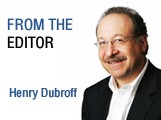How lessons from a Syrian refugee shaped our banking coverage
 Thirty years ago this spring, I walked into the newsroom at The Springfield Newspapers in Western Massachusetts and started my first job in business journalism.
Thirty years ago this spring, I walked into the newsroom at The Springfield Newspapers in Western Massachusetts and started my first job in business journalism.
I was greeted by a portly gentleman in his 50s who was impeccably dressed in a suit and tie. He introduced himself as Marwan Jabri and I soon learned of his improbable history.
A native of Aleppo, Syria, he was the son of a wealthy merchant who had briefly, in the post-World War II era, guaranteed the exchange rate of the Syrian pound. Neither the government nor the central bank was fully functioning for a few months, but trade went on and papa Jabri probably made a pretty penny.
Schooled in Beirut and Paris, Marwan was a man of ideas who gravitated naturally to journalism. He had a worldly outlook, an eye for detail and a good feel for markets. He believed it was in the best economic interest of the Middle East to make peace with Israel and embrace a market economy.
That sort of thinking did not sit well with the regime of Hafez Al-Assad, the patriarch who ruled Syria with an iron fist. Marwan was chased out of the Middle East and later Paris by the Syrian secret service.
At one point he told me that he came home from a night out to find that a bomb had gone off in his apartment. Whether it was an assassination attempt or a warning blow was not clear. Shortly thereafter he came to the United States as a political refugee.
He became a U.S. citizen and found his way back into journalism working at Agence France-Presse in New York. In Springfield, his title was business editor of the Daily News, our company’s afternoon newspaper. I was technically a reporter for the rival Morning Union, but our competition didn’t last long as our owner decided to merge the business news desks. I was the new kid on the block in our two-reporter department and the low man on the totem pole.
Marwan and I divided the world into two parts. He held on to banking and economic coverage, which kept him rooted to his desk and for the most part meant he could come in at 9 a.m. and leave at 5 p.m. I got technology, agriculture, manufacturing retail and anything that would get me out of the office and on the road.
Lately, I’ve been thinking a lot about Marwan. What got me started was the citizens of Syria I’ve been watching on television news every night. The intellectual honesty of its liberal dissidents reminded me of Marwan and others from his generation whose ideas were suppressed.
These days it is the dictator’s son, Bashar Al-Assad, who is in charge. Some 9,000 people have been killed amid the crackdown by the security services. I am reminded that Marwan had a nervous habit of looking over his shoulder anytime we walked out of the newspaper building and onto the street to grab a sandwich.
Then there is banking. Marwan had a gift for understanding the sometimes arcane accounting of the banking business. He grasped the importance of things like capital ratios and stable, low-cost deposits — things that I had studied in theory at Columbia but had not yet experienced in a real-time setting.
He assiduously watched the banking beat and pointed out small anomalies in loan reserves or rising deposit costs. Fortunately for us, we were covering business news in the aftermath of the “double-dip” recession in the early 1980s. Bank balance sheets were strengthening dramatically as real estate prices rose and interest rates tumbled from the double-digit levels forced on the economy by the Federal Reserve to break the back of inflation.
I left the Springfield Newspapers in 1985, and Marwan retired soon thereafter. He died in 2000 at age 71.
Marwan’s rules of the road for spotting banking problems have served me well over the years. I’m grateful for his global perspective and as I watch the tragic events unfold in his native Syria, I am saddened by the loss of life and destruction.
Although the odds are against them, the world would be much better off if the Syrians who think like Marwan did were to carry the day.
• Contact Editor Henry Dubroff at [email protected].









